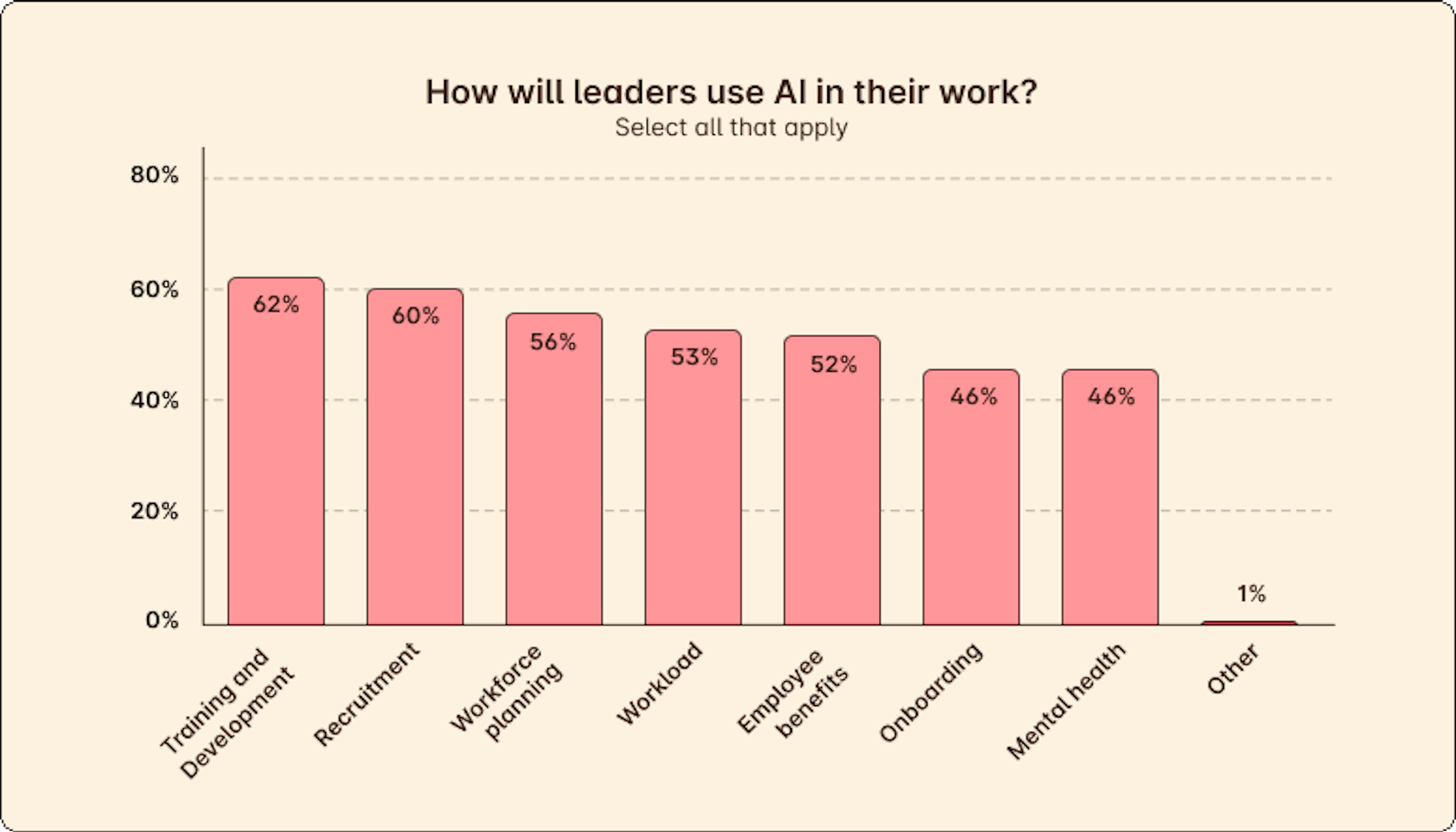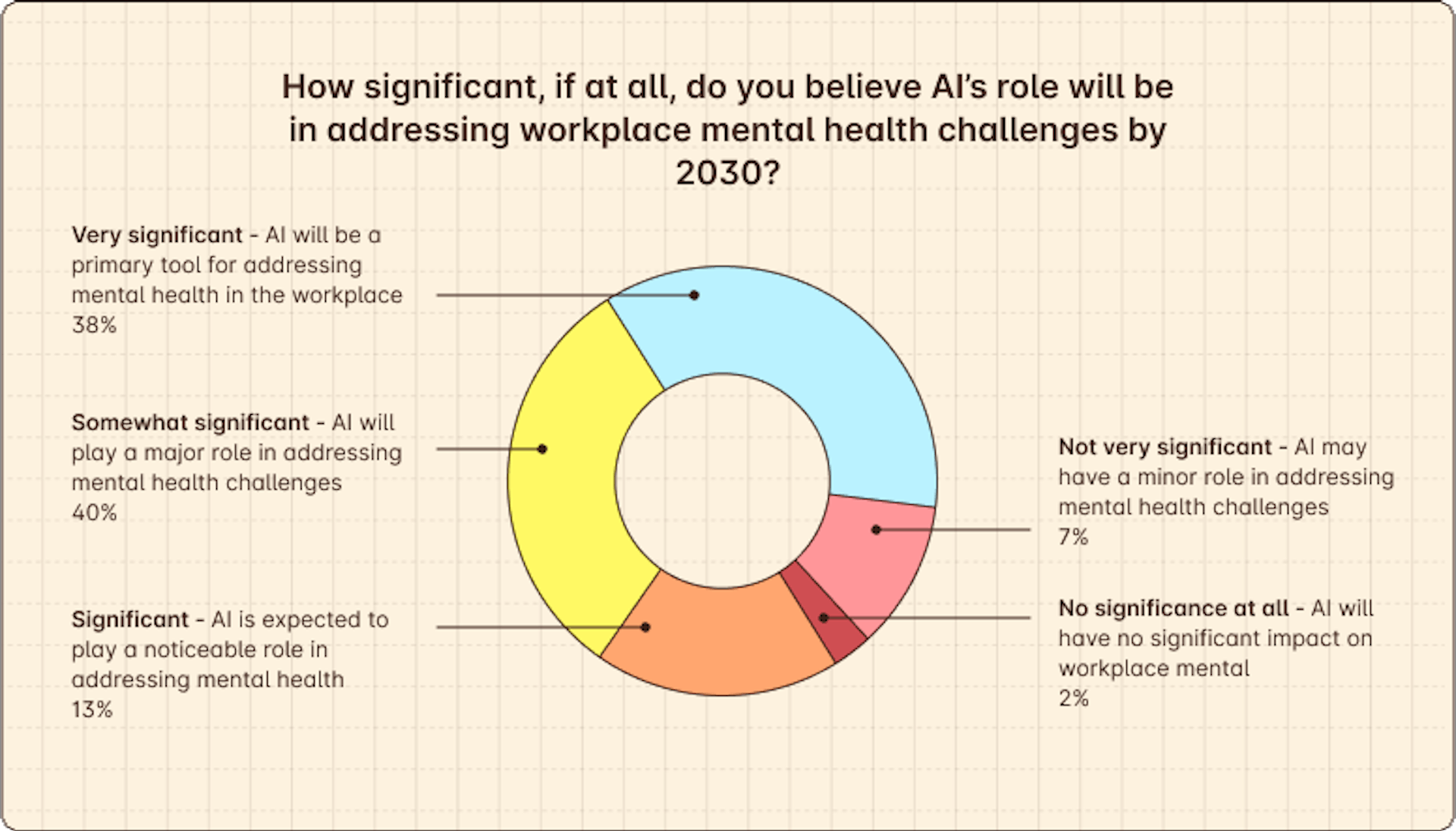The future of AI for HR leadership and employee wellbeing

Dr. Jazz Croft
13 February 2024

Content
- Being part of the change
- Could AI banish ‘quiet quitting’?
- The promises of AI for mental health at work
- Chatbots and check-ins for employees
- Greater organisational insight
- Upskilling managers for team-wide wellbeing
- Top concerns for HR leaders: ethics and empathy
- Hallucinating a better future?
- Supplements, not substitutes for human innovation
- Takeaways
Whether the advent of AI brings utopia, dystopia or something in between, how leaders use AI will define the world of work.
Our new Workplace Wellbeing Trends report, HR 2030, showed that 9 out of 10 HR leaders plan to use AI in their people management.
With leaders ready to embrace AI, we share our insight into the future of AI at work, including mental health, and how leaders can navigate this brave new world.

Being part of the change
Based on our survey of 3,625 HR leaders in large organisations across the US, UK and ANZ, our results showed cautious optimism about the future of AI, with 70% of leaders building AI protocols and guidelines. Using expertise to implement these guardrails is crucial to building trust, supporting employees and driving positive change.
For organisations less tuned into AI developments, they face the reality that their competitors are likely to use AI to innovate more rapidly. Whether that’s with enhanced wellbeing benefits that attract and retain top talent or by streamlining HR processes, the promises of AI are now part of the business landscape.
To respond to these changes and innovate effectively, organisations have to adapt rapidly to make the most of AI and employee collaboration. This will mean adapting job roles and upskilling employees in emerging technologies.
Could AI banish ‘quiet quitting’?
The promise of AI to further automate and outsource routine tasks is, without doubt, revolutionary for the workforce. According to the World Economic Forum, around 40% of all working hours could be affected by AI.
One area of change is the kind of work humans will carry out. By automating routine tasks, employees could redirect their efforts to work that promotes skill development by delving into tasks that require problem-solving and critical thinking.
With this extra support from AI, less demand on employees may turn back the tide on rising levels of burnout and stress over this decade and make work more satisfying.
For organisations, more resources from AI can offer greater opportunities to invest in employee training, wellbeing support and other initiatives that can attract talent and contribute to a high-performance culture.
If work does become more engaging thanks to AI and more investment from organisations in their people, disengagement and ‘quiet quitting’ may become less of a concern for HR leaders.
The promises of AI for mental health at work
A crucial part of AI in the workplace will be using AI for mental health support. In the workplace, there are three areas of development: employee support, organisational insights and upskilling managers.

Chatbots and check-ins for employees
We’re all familiar with chatbots, whether for customer services or health tech, and AI promises to make this tech even more sophisticated with further customisation. AI is already improving access to mental health support via chatbots. A recent study found that AI chatbots can effectively cut treatment waiting times and improve mental health outcomes by providing clinical information, freeing up demand and streamlining processes. At work, AI chatbots can address shortages in barriers to mental health support with instant access to resources, 24/7 support and triaging for professional help.

Greater organisational insight
Just as machine learning has revolutionised how we use tech (and gives us Spotify wrapped every year), AI can further increase the power of data analytics through pattern recognition and analysis of massive datasets.
At work, AI can help preventative approaches to mental health across organisations by anticipating employee needs and providing actionable insights to HR leaders.
Whether it’s leveraging data from wearables, more intuitive methods of measuring employee engagement or analysing user interaction with mental health tools, AI will be able to support data-driven decision-making, flag areas of difficulty and align investment with employee demand.
Regular check-ins can foster a culture of ongoing support, demonstrating to employees that their wellbeing is a priority. This contributes to higher employee satisfaction, engagement and support from leadership.
And these insights can help drive better outcomes. Organisations can allocate resources, monitor investment and provide targeted interventions that align with the workforce's needs.
Upskilling managers for team-wide wellbeing
Finally, AI chatbots can upskill managers in multiple ways. They can provide a space for coaching, accessing resources and role-playing scenarios to help build confidence in discussing mental health with their employees and spotting the warning signs of poor mental health. With accessible, scalable resources using AI, managers are empowered to build psychological safety and a culture of sustainable high performance in their teams.
This area could have a profound impact on the wider workforce. Managers currently experience a shortage in skills around wellbeing, with currently two-thirds of managers unable to engage with the mental health of their teams.
With managers having a significant impact on the wellbeing of employees, AI could help transform wellbeing across organisations.
Top concerns for HR leaders: ethics and empathy
But these promises in innovation aren’t without risks. In our survey, HR leaders highlighted the risks of AI for mental health support in the workplace.

Many experts share these concerns. In a recent scientific editorial, the rising costs of healthcare and shortages in psychological support worldwide are argued as reasons why dehumanising mental health support may be a cost worth paying if AI does effectively improve mental health.
And we’re only just starting to understand the impact of AI on mental health. If AI does make a positive impact on lives, it may redefine what we understand mental health care to be and the way that we access it.
While these issues are unlikely to be solved overnight, leaders can balance these risks and assess the suitability of AI tools for different contexts and employee needs.
The importance of clinical governance
As with all mental health interventions, AI tools need clinical governance and expert checks to protect users and support them effectively. The responsibility of organisations to minimise the risk of harm will be in accessing tools that use clinical safeguarding.
In a largely unregulated global digital health marketplace, organisations must interrogate and monitor the efficacy of AI services they provide for their employees’ mental health.
Hallucinating a better future?
With the AI revolution only just beginning, there are many unknowns about how the world will look in 2030. If AI does deliver on its promises, the world of work will change rapidly, but it will also rely on widespread human expertise to work with these emerging technologies.
For many who use AI at the moment, it’s clear that humans need to leverage and be cautious about how AI is used. In 2023, the Cambridge Dictionary chose ‘hallucinate’ as its word of the year, which, beyond its human definitions, now refers to cases when AI makes up false information.
As every chatbot disclaimer will tell you, not everything AI generates is true. From making up scientific citations to generating misinformation to complete nonsense, it’ll require human skills of critical thinking, fact-checking and careful consideration to use AI in safe and ethical ways.
Supplements, not substitutes for human innovation
While AI mental health support tools can address barriers to care, they should be treated as a supplement, not a replacement for human connection. While technology changes, human needs for relationships and shared experiences remain the same.
For wellbeing, leaders are right to be concerned that AI doesn’t have the human touch for wellbeing support. Cultivating relationships at work for social support and effective management must remain a central focus of wellbeing in organisations alongside innovation in AI.
Comparing AI to smartphones, decades ago it would have been unthinkable that we would spend hours a day on our phones or what role they would play in delivering healthcare, including mental health interventions.
If AI becomes similarly integrated into our lives, by 2030 we could see AI at work as part support as part of a broader ecosystem of resources that won’t displace the needs of employees but can offer valuable ways to support them.
Takeaways
- HR leaders are embracing AI for innovation. Organisations can stay competitive by developing AI protocols, upskilling employees and adapting job roles.
- AI offers multiple ways to support mental health at work. Through AI chatbots for employees, data analytics and manager coaching.
- Leaders are also right to be concerned about risks. Lack of empathy and human understanding were top concerns for using AI mental health interventions.
- Clinical governance is critical to protecting employees. In a largely unregulated marketplace, organisations must select products that use expert safeguarding to protect their employees.
To find out more about AI and other top workplace trends for HR leaders, read our HR 2030 Trends Report.
About the Author

Dr. Jazz Croft, Senior Scientific Liaison
About the Author
